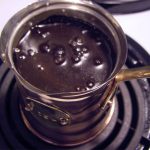 A medical preparation made by boiling the ingredients.
A medical preparation made by boiling the ingredients.
Water-based preparation of root, bark, berries, or seeds simmered in boiling water.
Soup is always a decoction but it may also be a concoction. The difference between the two culinary terms is that when you decoct something you boil it until you have extracted flavour, ending up with a bouillon, on the other hand, when you concoct something, you take serveral ingredients and boil them together so that their flavours merge. Both words derive from the Latin coquere, meaning to cook, but they are distinguished by their prefixes: de means away from, while con means together. Decoction has been a culinary term since the fifteenth century; concoction only since the nineteenth.
Made by extracting medicines from tougher parts of the plant including roots, bark or berries; decoction is accomplished by simmering the tough parts of the tree in a covered pan of water over medium-low heat for thirty minutes to five hours depending on degree of toughness. Once this process is complete ashe is readily available for healing work in the brew, which is formally called a decoction but can be called a potion or by another name. (crosscultural; mainly Western).
A tea created by placing the herb in water, bringing the water to a boil, and simmering for a set time, usually 10 minutes or less (compare to “infusion” and “tincture”).
An extract obtained by boiling the plant or herb in water.
An herbal preparation made by boiling an herb, generally a bark, root, or seed, in a covered enamel or other wise nonmetallic container of water for 15 minutes or longer.
A preparation made by boiling or simmering a plant part in water. Compare in fusion.
The extraction of the water-soluble bio-actives by simmering to more forcefully extract the active ingredients from tough plant matter such as root, bark, berries, or peel. A standard daily decoction for plants used as foodstuffs is 1.41 ounces (40 g) fresh or 0.71 ounces (20 g) dried in 3 cups (750 ml) cold water, reduced to 2 cups (500 ml) after simmering.
A liquid preparation obtained by boiling medicinal plant substances in water and extracting drugs by straining the preparation.
Watery extract obtained by boiling.
A herbal preparation, where the plant material (usually hard of woody) is boiled in water and reduced to make a concentration extract.
The liquid left after boiling the herb root or bark to extract the properties.
A medicinal tea in which the ingredients from the tougher parts of plants—fresh or dried root, seed, bark, or berries—are extracted by simmering, rather than steeping, the herb in water.
A liquid medicinal preparation made by boiling vegetable substances with water. Liquid extracts obtained this way are often used in herbal medicines.
A herbal remedy extracted from fibrous plant material, such as roots, bark and seeds, by simmering in water.
The extraction of water-soluble constituents of a medicinal plant by boiling; a medicinal preparation obtained in this way.
A preparation made by simmering a substance in water. A decoction is often made of hard substances, such as roots, bark, or seeds, since it takes long exposure to heat to extract their active principles. The water is only simmered, however, for vigorous boiling may destroy the vital properties of the plant. Usually an ounce of the herb is combined with a pint of boiling water, covered, and simmered for half an hour or more. Some herbalists prefer to use more than a pint to compensate for the liquid lost during the simmering. The preparation is strained and cooled before administration. It should be used immediately for it loses viability rapidly.
An extraction of the water-soluble constituents of a medicinal plant, made by boiling it in water.
A term in pharmacy for a substance made by boiling plant material in water. Technically, jam qualifies as a decoction.
The remaining liquid after boiling the root or bark of an herb to extract its properties.
